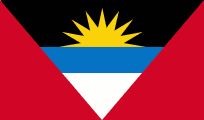INTELLECTUAL PROPERTY RIGHTS IN ANTIGUA AND BARBUDA

Opposition Term |
01 Month (but not exceeding 03 Months) |
Registration Term |
10 Years |
First Renewal Term |
10 Years |
Subsequent Renewal Term |
10 Years |
Antigua and Barbuda is a member state to the Madrid Protocol. Thus, the extension of an international registration of a trademark via the Madrid System is possible for this country.
The Trade Marks Act (2003) is the primary law governing the mechanism of trademark registration and protection in Antigua and Barbuda.
It follows a 'first-to-use' system, which subjects to presenting evidence of prior use of the mark in the country. Therefore, registration is not compulsory unless one has to enforce his or her rights.
For getting a trademark registered in the country, an application has to be filed at the trademarks registry in St. John's, Antigua.
It follows the 11th edition of Nice Classification. Multi-class applications are allowed.
Paris Convention priority can be claimed. Once the registration is complete, the Registrar’s Office will issue a certificate of registration.
All trademark applications are examined and are subject to absolute and relative grounds of refusal.
After formal examination and acceptance, the mark is published for opposition. Third parties can initiate opposition proceedings against a trademark application within one (01) month following its publication.
Registered trademarks have a validity of ten (10) years, which can be further renewed indefinitely for successive periods of ten (10) years each.
There is a grace period of six (06) months with a penalty to renew a registered trademark.
Although use of a registered trademark in Antigua and Barbuda is not required, once registered, if a trademark goes unused for a period of three (03) years, third parties may present cancellation actions based on the lack of use. The lack of use may be justified in certain circumstances.
A patent can be registered in Antigua & Barbuda pursuant to the Patents Act, 2018, which provides for the registration of the local patent applications.
Antigua and Barbuda has been a contracting party to the Paris Convention for the Protection of Industrial Property and the Patent Cooperation Treaty (PCT) since March 17, 2000.
Patent applications were previously accepted, but not examined or further processed by the Antigua and Barbuda Intellectual Property Office (IPO).
In Antigua & Barbuda, an invention that satisfies the conditions of originality, novelty, inventive step, and industrial applicability, subjects to patentability. Process patent and product patent are the two types of patents that can be protected.
The types of patent applications that can be filed include Non-Convention Application and Convention Application.
There is no provision for initiating opposition proceedings against pending patent applications. After grant, a third party may file and opposition/invalidity/revocation application.
Patents of inventions are granted for twenty (20) years from the filing date and utility model certificates are granted for seven (07) years from the filing date.
Once a patent has been registered in Antigua & Barbuda, there is an annual fee payable in advance to the Antiguan Government every year. The fee is due on or before the anniversary of the filing date of the patent.
A grace period of six (06) months is allowed for late payment of an annual fee on payment of a surcharge. If the fee is not paid within that time, the patent will lapse.
Once the patent registration term gets expired, it cannot be renewed further.
The Industrial Designs Act 2003 - governs and deals with the mechanism of registration of industrial designs in Antigua and Barbuda.
The International Classification for Industrial Designs (‘the Locarno Classification’), published by the World Intellectual Property Organization, is the system adopted for classifying design articles.
Industrial design applications are applications to register an industrial design with the national or regional Intellectual Property (IP) offices and designations received by relevant offices through the Hague System.
Industrial designs are applied to a wide variety of industrial products and handicrafts. They refer to the ornamental or aesthetic aspects of a useful article, including compositions of lines or colors or any three-dimensional forms that give a special appearance to a product or handicraft. The holder of a registered industrial design has the exclusive rights against unauthorized copying or imitation of the design by third parties. Industrial design registrations are valid for a limited period.
The total duration of industrial design registration is fifteen (15) years from the date of application. The initial registration term is five (05) years, which is further extendible for two (02) terms of five (05) years each upon payment of the renewal fee.
A period of grace of six (06) months shall be allowed for the late payment of the renewal fee on payment of the prescribed surcharge.
The Copyright Act, 2003 - is the basic legislation governing copyright protection in Antigua and Barbuda.
Antigua and Barbuda is a member of the Berne Convention.
The standard copyright protection term lasts for the lifetime of the author plus fifty (50) years following his death. However, the duration of copyright protection varies depending on the type of work.

